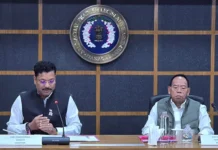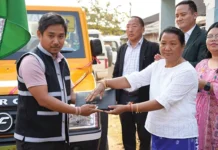PASIGHAT, 14 Nov: A two-day academic workshop on building academic capacity was organised by the Arunachal Pradesh University (APU) here in East Siang district from 13-14 November.
Jointly hosted by the APU’s sociology and tribal studies departments, in collaboration with RC-17: Collective Actions, Mobilisations, and Social Movements, and the Indian Sociological Society (ISS), the programme brought together faculty members and research scholars from across the state and country.
The keynote address, on the ‘Importance of academic reading and writing in the times of AI’, was delivered by ISS president Prof Maitrayee Chaudhuri. Her insightful address highlighted the balance between leveraging artificial intelligence and maintaining scholarly integrity in contemporary academia.
The two-day workshop featured sessions by distinguished resource persons from leading institutions. Prof Chandan Kumar Sharma (Tezpur University) conducted comprehensive sessions on academic reading and writing techniques, followed by hands-on practical training that enabled participants to apply learned concepts immediately, while Dr Rituparna Patgiri (IIT Guwahati) shared valuable insights on navigating the research publication landscape. Prof Shruti Tambe (Savitribai Phule Pune University) inspired the participants with her lecture on ‘Becoming a researcher in everyday life’.
Practical orientation was strengthened through hands-on sessions. APU Education HoD Prof Prakash Chandra Jena trained the participants on literature review and objective formulation, while Prof RK Mohanty (Mizoram University) concluded the technical sessions with expert advice on writing successful research and project proposals.
On the inaugural day, APU Tribal Studies Assistant Professor Dr Tarh Ramya emphasised the critical importance of capacity-building initiatives in strengthening the research ecosystem among the faculty members and research scholars.
The valedictory ceremony on the second day was presided over by APU Sociology Assistant Professor Dr Terbi Loyi, who expressed gratitude to the resource persons and the university administration for their support.
The workshop, conducted in the hybrid mode, allowed participants to engage both on campus and virtually, thereby widening its reach and accessibility. Covering essential aspects of academic practice -from fundamental reading and writing skills to advanced proposal development – the programme blended theoretical lectures with practical sessions. The highly interactive discussions reflected its success in fostering a collaborative learning environment for faculty and scholars.


